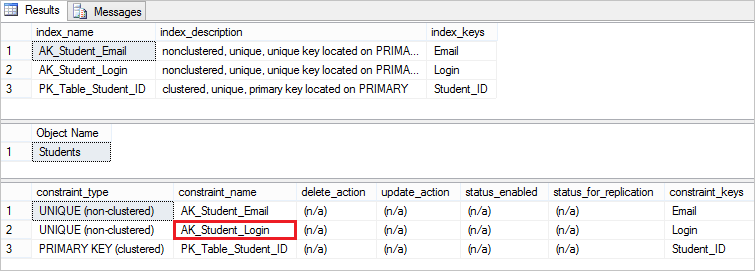Auto Generating Unique Key In Sql Table
Primary Key Generation Using Oracle's Sequence. Oracle provides the sequence utility to automatically generate unique primary keys. To use this utility to auto-generate primary keys for a CMP entity bean, you must create a sequence table and use the @AutomaticKeyGeneration annotation to point to this table. In your Oracle database, you must create a sequence table that will create the primary. Using generators to create unique row IDs Why row IDs at all? One for all or one for each? Can you re-use generator values? This works especially well because you usually have a unique Primary Key index on the ID column, and those are about the fastest indexes you can. Aug 09, 2013 Depending on your requirements, you might generate, say, 1 million unique keys, store them in a look-up table along with a numeric key (consecutive integers) and a column that indicates if the string has been used yet. Create a sequence.
- Auto Generating Unique Key In Sql Table For Sale
- Auto Generating Unique Key In Sql Table Example
- Sql Add Unique Key
- Oracle Unique Key
- Auto Generating Unique Key In Sql Table Examples
- Candidate Key
Auto Generating Unique Key In Sql Table For Sale
Much to the frustration of database administrators worldwide, prior to Oracle version 12c in mid-2014, Oracle simply had no inherent ability to inherently generate auto incrementing columns within a table schema. While the reasons for this design decision can only be guessed at, the good news is that even for users on older Oracle systems, there is a possible workaround to circumnavigate this pitfall and create your own auto incremented primary key column.
Creating a Sequence
Auto Generating Unique Key In Sql Table Example
The first step is to create a SEQUENCE in your database, which is a data object that multiple users can access to automatically generate incremented values. As discussed in the documentation, a sequence in Oracle prevents duplicate values from being created simultaneously because multiple users are effectively forced to “take turns” before each sequential item is generated.
For the purposes of creating a unique primary key for a new table, first we must CREATE the table we’ll be using:
Next we need to add a PRIMARY KEY constraint:
Finally, we’ll create our SEQUENCE that will be utilized later to actually generate the unique, auto incremented value.
Adding a Trigger
While we have our table created and ready to go, our sequence is thus far just sitting there but never being put to use. This is where TRIGGERS come in.
Similar to an event in modern programming languages, a TRIGGER in Oracle is a stored procedure that is executed when a particular event occurs.
Sql Add Unique Key
Typically a TRIGGER will be configured to fire when a table is updated or a record is deleted, providing a bit of cleanup when necessary.
Oracle Unique Key
In our case, we want to execute our TRIGGER prior to INSERT into our books table, ensuring our SEQUENCE is incremented and that new value is passed onto our primary key column.
Here we are creating (or replacing if it exists) the TRIGGER named books_on_insert and specifying that we want the trigger to fire BEFORE INSERT occurs for the books table, and to be applicable to any and all rows therein.
The ‘code’ of the trigger itself is fairly simple: We SELECT the next incremental value from our previously created books_sequenceSEQUENCE, and inserting that into the :new record of the books table in the specified .id field.
Note: The FROM dual part is necessary to complete a proper query but is effectively irrelevant. The dual table is just a single dummy row of data and is added, in this case, just so it can be ignored and we can instead execute the system function of our trigger rather than returning data of some kind.
Auto Generating Unique Key In Sql Table Examples
IDENTITY Columns
IDENTITY columns were introduced in Oracle 12c, allowing for simple auto increment functionality in modern versions of Oracle.

Candidate Key
Using the IDENTITY column is functionally similar to that of other database systems. Recreating our above books table schema in modern Oracle 12c or higher, we’d simply use the following column definition.
Dkim key format. Our DKIM wizard generates the public / private 1024 bit key pair you need to setup DomainKeys/DKIM. This DKIM record generator also includes specific instructions on how to setup the Hurricane Server and your DNS server. How to Use this Domain Key Generator. To use the DKIM wizard, first specify a domain and a selector. The domain and the selector are not used in the generation of the public / private key pair. Generate a DKIM Core Key. Enter the domain you'd like to generate keys for, for example dkimcore.org and hit the button. This online wizard is fine for generating keys for testing and evaluation. If you decide to use DKIM Core in production, though, you might want to consider the security risks.
Related Articles
- Windows 98 Key Generator Download
- Windows Xp Home Activation Key Generator
- Website Auto Traffic Generator Ultimate Activation Key
- Generate Sas Key Service Bus
- Microsoft Streets And Trips 2011 Key Generator
- Pinnacle Studio 15 Activation Key Generator
- Windows Xp Sp3 Cd Key Generator
- 4500 Crypto Key Generate Rsa